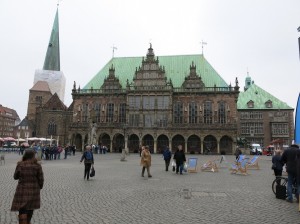Last week we (Prof Sara Ashencaen Crabtree and Prof Jonathan Parker) were fortunate to have been in Germany sharing and discussing social science research and its potential for achieving positive change in people’s lives.
First of all we attended the XVII SocNet98 conference held at the Hochschule Bremen, taking with us eight students from the Department of Social Sciences and Social Work in the Faculty of Health and Social Sciences.
At the conference we presented two extended workshop sessions and hosted a publishing meeting. The first session was particularly exciting for us as it introduced faculty and students from across Europe, including Finland, Belgium, Austria, Germany, the Czech Republic and the UK, to the centrality of religion and spirituality in understanding and accounting for people’s welfare needs; especially important given continuing migration patterns and recognition of a super-diversity of ethno-cultural and religious positions.
It was great that our three first-year sociology students attending with us were able to assist us in facilitating discussion subsequent to the presentation and to offer their own perspectives; something to add to their CVs! The five social work students who attended with us expressed recognition of the importance of intercultural and international sharing of ideas. All students found this opportunity illuminated their understanding of their discipline within the broader framework of academic internationalisation.
The Whiting & Birch international book series Critical Studies in Socio-Cultural Diversity has published two books relating to proceedings in previous SocNet98 conferences. Following the publishing meeting held in Bremen it was decided that a third would be published from this year’s conference edited by our colleague Prof Dr Christian Spatscheck and ourselves. This will include the paper given by our three sociology students Dan Marsh, Emilie Reeks and Ceyda Vasif and us; an excellent outcome for them in stepping up to their first academic publication.
Secondly, we gave an invited lecture at the University of Vechta, a dynamic rural university with a fascinating history reflecting preoccupations with prisons, penology and intensive animal farming. Vechta itself boasts of being the home region of the fabulous, real-life Baron von Munchausen. The invited guest lecture allowed us to promote awareness of the plight of the Orang Asli of Tasik Chini from our ethnographic research undertaken on study leave in Malaysia last year; a study that is now being written up. We heard later that the lecture was very well received by students and staff attending. To our pleasure and surprise we also bumped into former Erasmus students from Vechta who had joined our sociology classes last year. We look forward to receiving more Vechta students this coming Autumn.
Subsequently, we negotiated research and publication opportunities with academic colleagues and an extension of our Erasmus links for student exchanges as we move forward towards approving our new Sociology and Criminology programme later this year. Vechta is well placed for partnership with this programme having a prison right next to the University – our colleagues assured us that the barbed wire atop the walls were not to keep in their students! Academic staff at Vechta were excited about developing programmes in English for reciprocating BU Erasmus exchanges and about possible prison visits and observations. In the late afternoon we visited an old prison within the town fort’s arsenal, replete with history and stark examples of potentially dualistic practices of disciplining the body and humiliation of the spirit throughout the history of regulating social behaviour in Vechta.
All-in-all this was a great week for today’s students, bodes well for future students and was a very productive one for ourselves.
Jonathan Parker & Sara Ashencaen Crabtree












 Fourth INRC Symposium: From Clinical Applications to Neuro-Inspired Computation
Fourth INRC Symposium: From Clinical Applications to Neuro-Inspired Computation Writing policy briefs
Writing policy briefs Upholding Excellence: The Concordat to Support Research Integrity
Upholding Excellence: The Concordat to Support Research Integrity Today’s Documentation Will Serve Tomorrow’s Justice
Today’s Documentation Will Serve Tomorrow’s Justice ECR Funding Open Call: Research Culture & Community Grant – Application Deadline Friday 12 December
ECR Funding Open Call: Research Culture & Community Grant – Application Deadline Friday 12 December MSCA Postdoctoral Fellowships 2025 Call
MSCA Postdoctoral Fellowships 2025 Call ERC Advanced Grant 2025 Webinar
ERC Advanced Grant 2025 Webinar Horizon Europe Work Programme 2025 Published
Horizon Europe Work Programme 2025 Published Horizon Europe 2025 Work Programme pre-Published
Horizon Europe 2025 Work Programme pre-Published Update on UKRO services
Update on UKRO services European research project exploring use of ‘virtual twins’ to better manage metabolic associated fatty liver disease
European research project exploring use of ‘virtual twins’ to better manage metabolic associated fatty liver disease